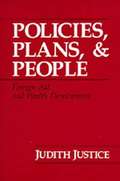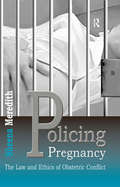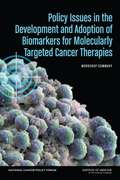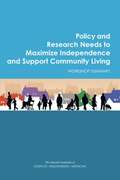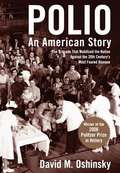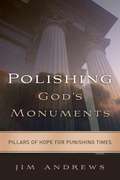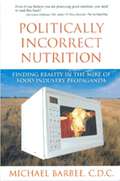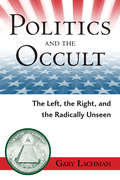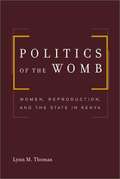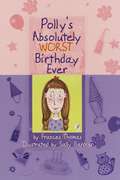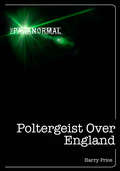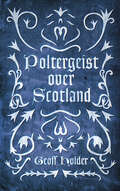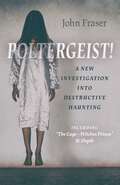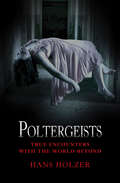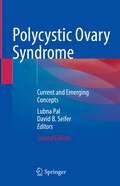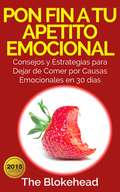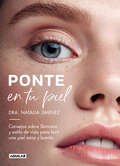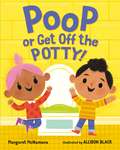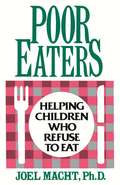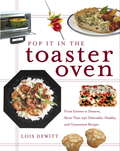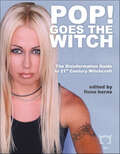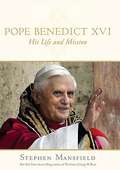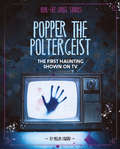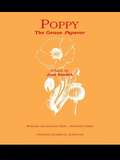- Table View
- List View
Police Unbound: Corruption, Abuse, and Heroism by the Boys in Blue
by Anthony V. BouzaFormer chief of police in Minneapolis and commander of the Bronx police force Tony Bouza pulls no punches in this blunt, candid assessment of police culture. Emphasizing the gap between the average citizen's perception of police work and the day-to-day reality of life as a cop, Bouza reveals the inner dynamics of a secretive, fraternal society that will do almost anything to protect itself. The strong bonds of loyalty among police both inspire individual acts of heroism in the face of danger but also repress full disclosure of the truth when corruption or abuse of power are suspected, says Bouza. Young rookies are quickly molded by the unspoken rules and the code of silence that govern a cop's professional life, and they soon learn that physical but not moral courage is expected. Bouza evaluates sweeps, roundups, sting operations, the controversial practice of racial profiling, and the politics of law enforcement. He critically examines the excesses, abuses, and corruption of the New York, Los Angeles, and Minneapolis police forces, among others, offering insights into what went wrong in the infamous Louima and Diallo cases. But his most telling criticism is not directed against the police per se but against our society's ruling elites and the middle class, who give police the unmistakable message that the underclass must be kept down and property owners protected at all costs. He charges that the heart of the problem of both crime and police abuse in America is our tacitly accepted class structure separating the privileged from the poor, and along with it the systemic racism that society as a whole is not yet willing to face. Bouza concludes his critique on a positive note with straightforward proposals on how to make the police more ethical and effective. This controversial, eye-opening book by a veteran insider exposes a reality that TV cop shows never portray and raises serious moral questions about class and race.
Policies, Plans, and People: Foreign Aid and Health Development
by Judith JusticeJudith Justice uses an interdisciplinary approach to show how anthropologists and planners can combine their expertise to make health care programs culturally compatible with the populations they serve.
Policing Pregnancy: The Law and Ethics of Obstetric Conflict
by Sheena MeredithAre pregnant women entitled to the same rights of self-determination and bodily integrity as other adults? This is the fundamental question underlying recent high-profile legal interventions in situations when pregnant women and healthcare staff do not agree on management options or appropriate behaviour. Courts on both sides of the Atlantic have sometimes answered that they are not, and the law has at times been manipulated to enforce compliance with medical recommendations. This is the first book of its kind to offer a comprehensive assessment of healthcare law as applied to the unique situation of pregnancy. Drawing on case material from both the UK and the USA, it describes the trend towards 'policing pregnancy' and explores the emergence of the concept of 'maternal-foetal conflict' - and why, in the author's view, this would be more appropriately labelled 'obstetric conflict'. Suggestions are made for alternative approaches that better safeguard the overall well-being of pregnant women and their future children.
Policy Issues in the Development and Adoption of Biomarkers for Molecularly Targeted Cancer Therapies: Workshop Summary
by Sharyl J. NassA long-held goal in oncology has been to develop therapies that target the specific abnormalities in each patient's cancer rather than simply treating cancers based on the tissue of origin. In the past decade, advances in technology have enabled researchers to relatively quickly and inexpensively determine, in minute detail, the genetic makeup of tumors. Although relatively few targeted cancer therapies are currently available in the clinic and it is not yet clear whether all cancers are driven by genetic changes that can be targeted, there is widespread optimism in the cancer community that this new ability to assess the genetic abnormalities in tumors will ultimately lead to better cancer treatments and improved patient outcomes. "Policy Issues in the Development and Adoption of Biomarkers for Molecularly Targeted Cancer Therapies" is the summary of a workshop convened in November 2014 by the Institute of Medicine's National Cancer Policy Forum to discuss recent trends in the development and implementation of molecularly targeted cancer therapies and explore potential policy actions to address specific challenges. This report highlights the presentations and discussions at the workshop.
Policy and Research Needs to Maximize Independence and Support Community Living: Workshop Summary
by Engineering Medicine National Academies of SciencesLiving independently and participating in one’s community are priorities for many people. In many regions across the United States, there are programs that support and enable people with disabilities and older adults to live where they choose and with whom they choose and to participate fully in their communities. Tremendous progress has been made. However, in many cases, the programs themselves – and access to them – vary not only between states but also within states. Many programs are small, and even when they prove to be successful they are still not scaled up to meet the needs of the many people who would benefit from them. The challenges can include insufficient workforce, insufficient funding, and lack of evidence demonstrating effectiveness or value. To get a better understanding of the policies needed to maximize independence and support community living and of the research needed to support implementation of those policies, the National Academies of Sciences, Engineering, and Medicine convened a public workshop in October 2015. Participants explored policies in place that promote independence and community living for older adults and people with physical disabilities, and identified policies and gaps in policies that can be barriers to independence and the research needed to support changing those policies. This report summarizes the presentations and discussions from the workshop.
Polio: An American Story
by David M. OshinskyAll who lived in the early 1950s remember the fear of polio and the elation felt when a successful vaccine was found. Now David Oshinsky tells the gripping story of the polio terror and of the intense effort to find a cure, from the March of Dimes to the discovery of the Salk and Sabin vaccines - and beyond. Here is a remarkable portrait of America in the early 1950s, using the widespread panic over polio to shed light on our national obsessions and fears. Drawing on newly available papers of Jonas Salk, Albert Sabin and other key players, Oshinsky paints a suspenseful portrait of the race for the cure, weaving a dramatic tale centered on the furious rivalry between Salk and Sabin. Indeed, the competition was marked by a deep-seated ill will among the researchers that remained with them until their deaths. The author also tells the story of Isabel Morgan, perhaps the most talented of all polio researchers, who might have beaten Salk to the prize if she had not retired to raise a family. As backdrop to this feverish research, Oshinsky offers an insightful look at the National Foundation for Infantile Paralysis, which was founded in the 1930s by FDR and Basil O'Connor. The National Foundation revolutionized fundraising and the perception of disease in America, using "poster children" and the famous March of Dimes to raise hundreds of millions of dollars from a vast army of contributors (instead of a few well-heeled benefactors), creating the largest researchand rehabilitation network in the history of medicine. The polio experience also revolutionized the way in which the government licensed and tested new drugs before allowing them on the market, and the way in which the legal system dealt with manufacturers' liability for unsafe products. Finally, and perhaps most tellingly, Oshinsky reveals that polio was never the raging epidemic portrayed by the media, but in truth a relatively uncommon disease. But in baby-booming America - increasingly suburban, family-oriented, and hygiene-obsessed - the specter of polio, like the specter of the atomic bomb, soon became a cloud of terror over daily life. Both a gripping scientific suspense story and a provocative social and cultural history, Polio opens a fresh window onto postwar America.<P><P> Pulitzer Prize Winner
Polishing God's Monuments: Pillars of Hope for Punishing Times
by Jim AndrewsPolishing God's Monuments is the true story of a young woman and her devoted husband who face it all (and then some) as a baffling, mind-boggling illness hijacks their youth and shatters their dreams. Polishing God's Monuments blends straightforward theology with the account of this young couple's afflictions. A sober reality in the life of faith is that "through many tribulations we must enter the kingdom of God." God's people are buffeted in two ways: sometimes we suffer for the faith and other times we suffer with faith. Either way, our faith remains a work in progress. In the midst of troubles, our emotions can vacillate between hope and despair, submission and rebellion. Our understanding can alternate between moments of comprehension and times of total confusion. This book confronts these issues head-on and offers believers biblical perspective, practical direction, and sustaining hope.
Politically Incorrect Nutrition
by Michael BarbeeDid you know that some noncaloric artificial sweeteners can actually make you fat—or even kill you? Did you know that the overconsumption of certain soy products can upset your hormonal balance and lead to hypothyroidism? Most people didn&’t, until now. Politically Incorrect Nutrition exposes many current and widely held beliefs foisted on both consumers and health-care practitioners by well-oiled, agenda-driven food industry propaganda. It analyzes popular claims and reveals what, in fact, is healthy—and what is decidedly unhealthy—by exploring the most current and objective scientific data regarding good nutrition.If you want to provide the best possible food for yourself and your family, or if you simply want to learn the truth behind the many food myths that are presented to us day after day, Politically Incorrect Nutrition is must reading.
Politics and the Occult: The Left, the Right, and the Radically Unseen
by Gary LachmanThe gritty business of politics is not something we usually associate with the occult. But esoteric beliefs have influenced the destiny of nations since the time of ancient Egypt and China, when decisions of state were based on portents and astrology, to today, when presidents and prime ministers privately consult self-proclaimed seers. Politics and the Occult offers a lively history of this enduring phenomenon. Author and cultural pundit Gary Lachman provocativly questions whether the separation of church and state so dear to modern political philosophy should be maintained. A few of his fascinating topics include the fate of the Knights Templar and the medieval Gnostic Cathars, the occult roots of America and the French Revolution in Freemasonry, Gurdjieff and the swastika, Soviet interest in UFOs, the CIA and LSD, the Age of Aquarius, the millenarian politics that inform the struggle with Islamic terrorism, fundamentalism, and more.
Politics of the Womb: Women, Reproduction, and the State in Kenya
by Lynn M. ThomasIn more than a metaphorical sense, the womb has proven to be an important site of political struggle in and about Africa. By examining the political significance--and complex ramifications--of reproductive controversies in twentieth-century Kenya, this book explores why and how control of female initiation, abortion, childbirth, and premarital pregnancy have been crucial to the exercise of colonial and postcolonial power. This innovative book enriches the study of gender, reproduction, sexuality, and African history by revealing how reproductive controversies challenged long-standing social hierarchies and contributed to the construction of new ones that continue to influence the fraught politics of abortion, birth control, female genital cutting, and HIV/AIDS in Africa.
Polly's Absolutely Worst Birthday Ever
by Frances ThomasPolly comes down with the chickenpox just in time for her ninth birthday.
Poltergeist Over England: Three Centuries Of Mischievous Ghosts (The Paranormal)
by Harry PriceAn extensive study of poltergeist phenomena which covers many historical cases researched from Price's own extensive occult library such as the Tedworth Drummer, Hinton Ampner, Willington Mill and the Bealings Bells as well as featuring cases with which Harry Price had personal involvement, namely Stella C, Eleonore Zungun, the Battersea poltergeist house & Borley Rectory.Harry Price begins by introducing readers to poltergeists, explaining what poltergeists actually are, the historical background around poltegeists, and what they do, before discussing specific poltergeist cases. With 12 photographs and accompanying explanatory commentaries, showing various places of poltergeist sightings, as well as a photograph of a poltergeist subject, this ebook will leave you full of knowledge and intrigue surrounding poltergeist phenomena.The Paranormal, the new ebook series from F&W Media International Ltd, resurrecting rare titles, classic publications and out-of-print texts, as well as new ebook titles on the supernatural - other-worldly books for the digital age. The series includes a range of paranormal subjects from angels, fairies and UFOs to near-death experiences, vampires, ghosts and witchcraft.
Poltergeist Over Scotland
by Geoff HolderIn 1945 the celebrated psi-researcher Harry Price published Poltergeist over England, popularising the word poltergeist (German for ‘noisy ghost’) and making famous the kind of physical haunting characterised by thrown objects, mysterious noises, and damage by fire or water. Now, for the first time, an astonishing array of historical Scottish poltergeist cases are gathered together, from the Middle Ages to the modern period - unearthing many episodes that have remained neglected for centuries. Some were no doubt hoaxes, but in others, multiple witnesses testified to disturbing events enacted over months. Whatever the true cause of the events, the historical evidence from Scotland suggests that poltergeist phenomena is undoubtedly real.
Poltergeist! A New Investigation Into Destructive Haunting: Including "The Cage - Witches Prison" St Osyth
by John FraserThere are few factual books written about poltergeist phenomena, John's Fraser's Poltergeist! A New Investigation Into Destructive Haunting fills that void, advancing and updating Colin Wilson's work Poltergeist!, this study's namesake from over 38 years ago. Fraser takes readers on a journey from the Borley Rectory to the Isle of Man, and grounds his readers in an historical overview of 'Poltergeist phenomena'. He examines where such events overlap with other paranormal investigations of 'apparitional' ghosts. What do they have in common, what do they differ? To answer this, Fraser looks to new research on paranormal events, never before published in book form. Fraser contends, perhaps controversially, that ghost sightings are and always will be ambiguous and near-impossible to prove, that only Poltergeist phenomena can be empirically verified.
Poltergeists: True Encounters With The World Beyond (True Encounters with the World Beyond #8)
by Hans HolzerParanormal expert Hanz Holzer investigates some of the most famous poltergeists in history Poltergeist is a German term that translates simply to “noisy ghost.” One of the main characteristics of a poltergeist is its high level of activity; it often manifests itself by moving or even throwing objects. Professor Hans Holzer reexamines these most menacing of hauntings, including the famous case of the Bell Witch of Tennessee, a nineteenth-century spirit, and the Millbrae Poltergeist, which crashes around a suburban home.
Polycystic Ovary Syndrome: Current and Emerging Concepts
by Lubna Pal David B. SeiferNow in a completely newly revised and expanded second edition, this comprehensive text presents the current state of the art in our understanding and management of polycystic ovary syndrome (PCOS), the most common hormonal disorder of reproductive aged women. The numerous bothersome symptoms of PCOS include menstrual irregularities, hirsutism, acne, scalp hair thinning, weigh excess and infertility; additionally, as they age, women with PCOS are at a higher risk for metabolic abnormalities such as diabetes and dyslipidemias, as well as for cardiovascular disease and even certain cancers. Despite improvements in our understanding of this condition, the exact cause/s of PCOS remain elusive; genetic, hormonal, metabolic and environmental underpinnings are all suggested as relevant. All chapters have been updated, with eight new chapters added across seven thematic sections. Part one discusses the epidemiology of PCOS in both adults and adolescents. Part two covers the pathophysiology of PCOS, including genetics, the hypothalamo-pituitary-ovarian and the hypothalamo-pituitary-adrenal axes, insulin resistance, inflammation, and obesity. The next three sections present the various management strategies, medical and surgical, for harnessing the symptomatology, including PCOS-related infertility; these chapters include added case material to provide real-world examples of the treatments in action and their efficacy. Part six covers the comorbidities that women with PCOS commonly encounter, such as issues of mental health, sleep disturbances, endometrial hyperplasia, and cancer, as well as examines the economic burden of PCOS. The final section discusses emerging concepts surrounding possible mechanisms and potential therapeutic approaches to PCOS, including angiogenic dysfunction, the role of vitamin D, future potential therapies to targeted AMH signaling. The closing chapter, by familiarizing the readers with the intergenerational implications of PCOS and by raising awareness of potential “ripple effects”, aims at alerting the community on a need for vigilance as regards the health of PCOS progeny. With contributions from leaders in the field, Polycystic Ovary Syndrome, Second Edition remains the gold-standard text on this common medical condition and a valuable resource for the wide range of healthcare professionals engaged in caring for the women with PCOS (including but not limited to reproductive endocrinologists, gynecologists, family physicians, dermatologists, mental health professionals), for the aspiring women's health providers of tomorrow, and for the researchers who are striving to unravel the mysteries of the complex entity that PCOS is.
Pon Fin A Tu Apetito Emocional
by The BlokeheadEste libro pretende equiparte con las habilidades necesarias para acabar con el apetito emocional en 30 días. Aprenderás alternativas más saludables que te pueden ayudar con los sentimientos negativos que detonan tus antojos de comida no saludable, cuando estás estresado emocionalmente. Hay, en verdad, esperanza para los que comen por sus emociones.
Ponte en tu piel: Consejos sobre Skincare y estilo de vida para lucir una piel sana y bonita
by Natalia JiménezUna guía para aprender a cuidar tu piel. La piel es el órgano más grande y visible del cuerpo humano. Todos envejecemos, pero es posible hacerlo de forma sana y natural. Por eso, la dermatóloga Natalia Jiménez ha creado una guía fácil y muy completa con las claves para lucir una piel bonita: estilo de vida, alimentación, ejercicio físico y skincare. Un manual para aprender a cuidar nuestra piel de manera efectiva: cuáles son los ingredientes perfectos que tienes que encontrar en una crema, cómo leer una etiqueta correctamente, la importancia del fotoprotector como antiaging, los mejores tratamientos estéticos quirúrgicos y no quirúrgicos y la rutina ideal de cuidado para cara y cuerpo. Un completo libro en el que una de las dermatólogas más prestigiosas de nuestro país nos ayuda a ponernos en nuestra piel. Mi objetivo a lo largo de este libro es dar un enfoque diferente sobre el cuidado de la piel y el proceso de envejecimiento: veremos cómo funciona cada tratamiento, qué es efectivo y en qué no merece la pena invertir. Además, intentaré sustituir el concepto antiaging, que tiene claras connotaciones negativas, por el de better aging: porque envejecer de una forma saludable es posible. La filosofía better aging está ganando terreno en la actualidad, como forma más coherente y respetuosa de cuidarnos con el paso de los años. Mi libro busca ser un manifiesto de esta corriente y acercar al lector todos los secretos del cuidado de la piel, basados en los estudios científicos y en mi experiencia personal en la consulta.
Poop or Get Off the Potty!
by Margaret McNamaraWhen Mason and Mia were babies, they pooped a lot—always in their diapers.Now that they're big kids, it's time to use the potty. But what is the potty for?Naps? NO.Books? NO.Playing the drums? No, no, no!Mason and Mia look ahead to official big-kid territory in Poop or Get off the Potty!, this hilarious, instructive story from with special emphasis on that momentous toddler milestone: pooping in the potty!
Poor Eaters: Helping Children Who Refuse To Eat
by Joel Macht Edward Goldson Sharon Felber TaylorAn accessible overview of anxiety, anxiety disorders, and the effectiveness of various behavioral and drug treatments. .
Pop It in the Toaster Oven: From Entrees to Desserts, More Than 250 Delectable, Healthy, and Convenient Recipes: A Cookbook
by Lois DewittAre you pressed for time, too tired to cook just for yourself, or simply looking for something beyond a microwaved frozen meal or take-out food loaded with fat, salt, and preservatives? Busy people want a real oven-baked dinner without all the fuss (not to mention the leftovers!).The solution? The trusty toaster oven—which is designed to bake, roast, toast, and broil small portions of food both efficiently and economically. This amazing cookbook will show time-pressed cooks how to prepare delicious, healthy meals quickly and easily, while opening their eyes to the wide range of dishes that are possible with this often underutilized appliance. Pop It in the Toaster Oven will inspire any bored eater to break out of the toast function with recipes such as Buttermilk Pancakes, Minted Lamb Chops, Ginger Miso Calamari, Spicy Beef Fajitas, and Pear Praline Pie. With special tips on choosing the best toaster oven and the proper cookware to use, Pop It in the Toaster Oven will help readers to rediscover this wonderfully convenient appliance.
Pop! Goes the Witch: The Disinformation Guide to 21st Century Witchcraft (Disinformation Guides)
by Fiona HorneFiona Horne—bestselling author and popular media personality—has compiled the ultimate insight into modern Witchcraft. Continuing the successful, oversize Disinformation Guide anthology format, an all-star cast of Witches and Wiccans cover an amazing array of topics.
Pope Benedict XVI
by Stephen MansfieldWhile often regarded as a conservative influence on the church, the Pope and his story defy easy categorization, argues bestselling author Stephen Mansfield. John Paul became a priest only after attending an underground seminary during the Nazi occupation of Poland. To keep his national culture alive during those dark years, young Karol started an outlawed theater troupe. He became a poet and a playwright, and, even after gaining an international reputation as a theologian, he still kept the artist's touch. Mansfield vividly recalls the Pope as the churchman whose courage helped to bring down communism, as the world figure who visited his would-be assassin's prison cell to extend forgiveness, and as the theologically conservative icon who fought for the poor and against the corruptions of capitalism more than any other world leader of his time. He is the first pope to enter a synagogue, the first to apologize for the Holocaust, and the first to visit a concentration camp. What is certain, says Mansfield, is that Pope John Paul II has had a decisive impact on our times, and not only as a religious leader: He has shaped our world as a philosopher, a statesman, an artist, and a "great soul. " In Pope John Paul II, Mansfield examines the Pope's influence on the world specifically from the perspective of a non-Catholic-a committed Christian without fealty to Rome. Mansfield's academic depth, his poetic but widely accessible writing style, and his ability to render complex religious ideas understandable to the non-religious, lend his treatment of Pope John Paul II significance for readers of all philosophies and faiths.
Popper the Poltergeist: The First Haunting Shown on TV (Real-Life Ghost Stories)
by Megan AtwoodIn February 1958, the Herrmann family began to experience strange events at their home in Seaford, New York. The first occurrences were harmless--just caps popping off of bottles. But soon things escalated. Dishes were smashed, bookshelves toppled over, and objects moved. Could these unexplained events have been the work of a devious poltergeist named Popper?
Poppy: The Genus Papaver
by Jenõ BernáthPoppy, the third volume in the series Medicinal and Aromatic Plants - Industrial Profiles presents up-to-date information on Poppy and related species. The introduction emphasizes the importance of Poppy, giving a historical evaluation. in the chapters describing the botany and taxonomy of the genus some novel aspects are discussed, e.g., special m

